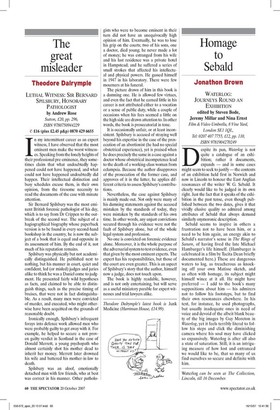The great misleader
Theodore Dalrymple LETHAL WITNESS: SIR BERNARD SPILSBURY, HONORARY PATHOLOGIST by Andrew Rose Sutton, £20, pp. 296, ISBN 9780750944229 £16 (plus £2.45 p&p) 0870 429 6655 1 n my intermittent career as an expert witness, I have observed that the most eminent men make the worst witnesses. Speaking from the lonely heights of their professional pre-eminence, they sometimes claim that what undoubtedly happened could not have happened, and what could not have happened undoubtedly did happen. Their intellectual distinction and busy schedules excuse them, in their own opinion, from the tiresome necessity to read the documents of the case with minute attention.
Sir Bernard Spilsbury was the most eminent British forensic pathologist of his day, which is to say from Dr Crippen to the outbreak of the second war. The subject of a hagiographical biography whose paperback version is to be found in every second-hand bookshop in the country, he is now the subject of a book that is equal and opposite in its assessment of him By the end of it, not much of his reputation remains.
Spilsbury was physically but not academically distinguished. He published next to nothing, but his manner in court, quiet and confident, led (or misled) judges and juries alike to think he was a Daniel come to judgment. He presented fairly wild hypotheses as facts, and claimed to be able to distinguish things, such as the precise timing of bruises, that were not in fact distinguishable. As a result, many men were convicted of murder, and executed, who might otherwise have been acquitted on the grounds of reasonable doubt.
Ironically enough, Spilsbury's infrequent forays into defence work allowed men who were probably guilty to get away with it. For example, he helped to secure a not proven guilty verdict in Scotland in the case of Donald Merrett, a young psychopath who almost certainly shot his mother dead to inherit her money. Merrett later drowned his wife and battered his mother-in-law to death.
Spilsbury was an aloof, emotionally detached man with few friends, who at best was correct in his manner. Other pathologists who were to become eminent in their turn did not have an unequivocally high opinion of him Eventually, he was to lose his grip on the courts; two of his sons, one a doctor, died young; he never made a lot of money; he was estranged from his wife and his last residence was a private hotel in Hampstead; and he suffered a series of small strokes that affected his intellectual and physical powers. He gassed himself in 1947 in his laboratory. There were few mourners at his funeral.
The picture drawn of him in this book is a damning one. He is allowed few virtues, and even the fact that he earned little in his career is not attributed either to a vocation or a sense of public duty, while a couple of occasions when his fees seemed a little on the high side are drawn attention to. In other words, the book is prosecutorial in tone.
It is occasionally unfair, or at least inconsistent. Spilsbury is accused of straying well beyond his expertise in the case of the prosecution of an abortionist (he had no special obstetrical experience), yet is praised when he does precisely the same in a case against a doctor whose obstetrical incompetence lead to the death of a working-class woman from eclampsia. Because the author disapproves of the prosecution of the former case, and approves of it in the latter, he applies different criteria to assess Spilsbury's contributions.
Nevertheless, the case against Spilsbury is mainly made out. Not only were many of his damning statements against the accused mistaken by the standards of today, they were mistaken by the standards of his own time. In other words, any unjust convictions secured through his evidence were not the fault of Spilsbury alone, but of the whole legal system and profession.
No one is convicted on forensic evidence alone. Moreover, it is the whole purpose of the adversarial system to test evidence, even that given by the most eminent experts. The expert has his responsibilities, but those of the court are even greater. This is an aspect of Spilsbury's story that the author, himself now a judge, does not touch upon.
The book is highly readable, however, and is not only entertaining, but will serve as a useful miniatory parable for expert witnesses and trial lawyers alike.
Theodore Dahymple's latest book is Junk Medicine (Harriman House, £14.99).







































































 Previous page
Previous page